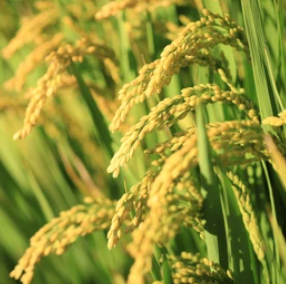Information report for PGL2;OsBUL1
Gene Details
|

|
Functional Descriptions
- Here, we report the involvement of another atypical bHLH protein gene, POSITIVE REGULATOR OF GRAIN LENGTH 2 (PGL2), in the regulation of rice grain length.
- Over-expression of PGL2 in the lemma/palea increased grain length and weight in correlation with the level of transgene expression.
- PGL2 interacts with a typical bHLH protein APG, a negative regulator of rice grain length and weight, in vitro and in vivo.
- It was reported that overexpression of BU1 (BRASSINOSTEROID UPREGULATED 1), the closest homolog of PGL2, caused an increase in grain length.
- These findings suggest that PGL2 and PGL1 redundantly suppress the function of APG by forming heterodimers to positively regulate the rice grain length, while the pathway through which BU1, the closest homolog of PGL2, controls grain length is independent of APG.
- Observation of the inner epidermal cells of lemma of PGL2-overexpressing lines revealed that the long grain size is caused by an increase in cell length.
- Rice leaf angle and grain size are affected by the OsBUL1 transcriptional activator complex.
- Transgenic rice plants expressing OsBC1 under the control of OsBUL1 promoter showed increased grain size as well as leaf bending while transgenic lines for dsRNAi and/or expressing a dominant repressor form of OsBC1 displayed reduced plant height and grain size.
- OsBUL1 knockout mutant (OsBUL1) and transgenic rice for double stranded RNA interference (dsRNAi) of OsBUL1 produced erected leaves with smaller grains whereas OsBUL1 overexpressors and an activation tagging line of OsBUL1 exhibited increased laminar inclination and grain size.
- To understand the molecular network of OsBUL1 function in rice, we isolated a novel OsBUL1-interacting protein, LO9-177, an uncharacterized protein containing a KxDL motif and functionally studied it with respect to the laminar inclination and grain size of rice.
- OsBUL1 COMPLEX1 (OsBC1) is a basic HLH (bHLH) transcriptional activator that interacts with OsBUL1 only in the presence of LO9-177 forming a possible trimeric complex for cell elongation in the laminar joint of rice.
- Three candidates, OsbHLH153, OsbHLH173 and OsbHLH174, quickly responded to BR and IAA involved in plant architecture except for OsbHLH173, whose expression level was too low to be detected; their overexpression in plants increased rice leaf angle.
- OsbHLH98 Regulates Leaf Angle in Rice Through Transcriptional Repression of OsBUL1.
- Our results demonstrate that OsbHLH98 negatively regulates leaf angle by counteracting brassinosteroid-induced cell elongation via the repression of OsBUL1 transcription.
Functional Keywords
- grain-length , palea , grain-size , brassinosteroid , grain , lemma , leaf , cell-elongation , height , plant-height , transcriptional-activator , architecture , iaa , BR , IAA , plant-architecture , leaf-angle
Literature and News
- An atypical bHLH protein encoded by POSITIVE REGULATOR OF GRAIN LENGTH 2 is involved in controlling grain length and weight of rice through interaction with a typical bHLH protein APG . DOI: 10.1270/jsbbs.62.133 ; PMID: 23136524
- Rice Leaf Angle and Grain Size Are Affected by the OsBUL1 Transcriptional Activator Complex . DOI: 10.1104/pp.16.01653 ; PMID: 27879391
- Genome-wide association studies reveal that members of bHLH subfamily 16 share a conserved function in regulating flag leaf angle in rice (Oryza sativa) . DOI: 10.1371/journal.pgen.1007323 ; PMID: 29617374
- OsbHLH98 regulates leaf angle in rice through transcriptional repression of OsBUL1 . DOI: 10.1111/nph.17303 ; PMID: 33638214
Gene Resources
- UniProt: Q6YUX0
- EMBL: AP005848, AP008208, AP014958
- AlphaFoldDB: Q6YUX0
- EnsemblPlants: Os02t0747900-01
- Gramene: Os02t0747900-01
- KEGG: dosa:Os02g0747900
- Orthologous matrix: ELMNTMD
- InterPro: IPR011598, IPR036638, IPR044293
- PANTHER: PTHR46446, PTHR46446:SF7
- SUPFAM: SSF47459
- PROSITE: PS50888
- Gene3D: 4.10.280.10
- OrthoDB: Q6YUX0
- SWISS-MODEL: Q6YUX0
- eggNOG: ENOG502SURH
Homologs
- Brachypodium distachyon: Bradi3g59290.1.p
- Hordeum vulgare: MLOC_55094.1
- Panicum virgatum: Pavir.1KG510700.1.p
- Setaria italica: Seita.1G319800.1.p
- Setaria viridis: Sevir.1G326000.1.p
- Triticum aestivum: Traes_6DL_3F9FA4887.1
- Zea mays: GRMZM2G036092_P01
Sequences
cDNA Sequence
- >LOC_Os02g51320.1
CACACACACTTCTCCCATCCAGCTAGCTTTTGCAGATCGAGCGAACCTTCAACACAAACCGGCCAGCTTGTTCCTCTCCTCTCTCTCTCTCTCTCTCTCTCTCTCGGTCGCAGCCAGCTAACTTCGAGTGTGAAGAACACTCACGCTAGCTAGCTTTCTCAAGGCCACATACGCTAGCTCCGCCTCCACGCGCGGCGTACGTCTAGTTTGATTGAGGCTGAAGAGAGTGCGTGTTTGGTAGAAGAGGCTAGCTGTTGACGATGTCGAGCAGAAGGTCGTCGCGTGGCTCCATCTCGGAGGAGGAAATCAACGAGCTCATCTCCAAGCTCCAGTCGCTGCTCCCCAACTCACGCCGACGCGGCTCCAGCCAGGCGTCGACGACGAAGCTGCTGAAGGAGACGTGCAACTACATCAAGAGCCTTCACCGGGAGGTGGATGACCTCAGCGACCGGCTGTCCGACCTCATGGCCACCATGGATCACAACAGCCCCGGCGCGGAGATCATCCGCAGCATCCTCCGCTCCTGATCGGCAAGCAGCAGCAGCAAGCGGCACCGGCCGGCCGGCCGGCCTATGTCGACGACGAGATAGGCCGGGCCGGCCGGGCAACGCCCGCGGCGCCAATTAATCAAGCGTACGTCCTGCCGGCGCCATTCTCCGGCCACCAGAGAGCATTTAGCTAGGGTATATATATCTACATATATAAAATATTTATGTCGTATGTCCCTCCCCAAATGTACGAGCCACGCTTACACGCGCGTGTATCGATCTCTCGATCTCTCTCTCTAAGCTCCACTCGAAGTAGGGCATTAGCACTAGGGGCCTAAGCAGAGGCTTATCCTCGCTTTAGCTCATATTTTCATCGCTTGATGTGTCCTCTCTGAACCCCCACATCTTGTCTTGTTTGGTTTTTCCCTCTCCCTTCCAATCTATGTAAATTTAGCTGGTGTGGTTTGGATCGAGTTGTGTCCTCTACAGACAACCGACCGACCACTACTACCTAGAGGAAATTAATATCATCATGGGTGTACTGCTCCAGCTTTAACTTCAATTCAGTTGGCTACGTACTACG
CDS Sequence
- >LOC_Os02g51320.1
ATGTCGAGCAGAAGGTCGTCGCGTGGCTCCATCTCGGAGGAGGAAATCAACGAGCTCATCTCCAAGCTCCAGTCGCTGCTCCCCAACTCACGCCGACGCGGCTCCAGCCAGGCGTCGACGACGAAGCTGCTGAAGGAGACGTGCAACTACATCAAGAGCCTTCACCGGGAGGTGGATGACCTCAGCGACCGGCTGTCCGACCTCATGGCCACCATGGATCACAACAGCCCCGGCGCGGAGATCATCCGCAGCATCCTCCGCTCCTGA
Protein Sequence
- >LOC_Os02g51320.1
MSSRRSSRGSISEEEINELISKLQSLLPNSRRRGSSQASTTKLLKETCNYIKSLHREVDDLSDRLSDLMATMDHNSPGAEIIRSILRS*